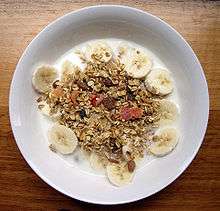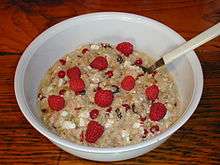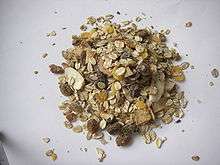Muesli
Muesli (/ˈmjuːzli/)[1][2]; Swiss German: Müesli [ˈmyəsli], non-Swiss Standard German: Müsli [ˈmyːsliː]) is a breakfast and brunch[3] dish based on raw rolled oats and other ingredients like grains, fresh or dried fruits, seeds and nuts, that may be mixed with cow's milk, soy milk, almond milk, other plant milks, yogurt, or fruit juice. Developed around 1900 by Swiss physician Maximilian Bircher-Benner for patients in his hospital,[4] muesli is available ready-made in a packaged dry form, or it can be made fresh.
In Switzerland and Germany, it is also eaten as a light evening dish called Birchermüesli complet, or muesli with butterbrot and coffee with milk.

Etymology
Originally known in Swiss German as Birchermüesli or simply Müesli, the word is an Alemannic diminutive of Mues which means "puree" or "mash-up."
History
Muesli was introduced around 1900 by the Swiss physician Maximilian Bircher-Benner for patients in his hospital,[4] where a diet rich in fresh fruit and vegetables was an essential part of therapy. It was inspired by a similar "strange dish" that he and his wife had been served on a hike in the Swiss Alps. Bircher-Benner himself referred to the dish simply as "d'Spys" (Swiss German for "the dish", in German "die Speise"). Muesli in its modern form became popular in Western countries starting in the 1960s as part of increased interest in health food and vegetarian diets. The original Bircher muesli was soaked overnight with water and lemon juice, and then eaten with yoghurt.
Original Bircher-Benner recipe
The original Bircher-Benner recipe consists of the following ingredients:
- Apples, "two or three small apples or one large one." The whole apple was to be used, including skin, core, and pips.
- Nuts, either walnuts, almonds, or hazelnuts, one tablespoon.
- Rolled oats, one tablespoon, "previously soaked in 3 tablespoons water for 12 hours."
- Lemon juice from half a lemon.
- Either cream and honey or sweetened condensed milk, 1 tablespoon.[5]
The dish was prepared by mixing the cream and honey or condensed milk with the soaked oats and lemon juice and, while stirring, grating the whole apple into the mixture. This method prevented the apple pulp from browning. The intent was to serve the dish fresh, immediately before any other dishes in the meal.[5]
Fresh muesli

Muesli usually and traditionally is freshly prepared using either dry rolled oats or whole grain oats that have been soaked in water or fruit juice. Other common ingredients are additional grated or chopped fresh fruit (e.g., bananas, apples, berries, grapes, mango), dried fruit, milk products (e.g., fresh milk, yogurt, cream, condensed milk, fromage frais, quark, cottage cheese, or nondairy milk substitutes), lemon juice, ground nuts, seeds, spices (especially cinnamon), honey and muesli mix.
Packaged muesli

Packaged muesli is a loose mixture of mainly rolled oats or cornflakes together with various dried fruit pieces, nuts, and seeds – the main ingredients of any muesli. It commonly contains other rolled cereal grains such as wheat or rye flakes.
There are many varieties, which may also contain honey, spices, or chocolate. This dry packaged muesli can store for many months and be served quickly after mixing with milk, filmjölk, yogurt, coffee, hot chocolate, fruit juice, or water. If desired, pieces of fresh fruit may be added. Alternatively, the mix may be soaked overnight in milk and then served with fresh fruit or compote to taste.
See also
- Granola, a breakfast and snack food similar to muesli
- Muesli belt malnutrition
- Porridge, a hot dish made with oats
References
- ↑ https://www.oxfordlearnersdictionaries.com/definition/english/muesli
- ↑ https://dictionary.cambridge.org/dictionary/english/muesli
- ↑ Planet, L. (2 March 2015), The World's Best Brunches: Where to Find Them and How to Make Them, Lonely Planet Publications, p. 294, ISBN 978-1-74360-881-4 – via Google books
- 1 2 Kurmann, Joseph A.; Rasic, Jeremija L.; Kroger, Manfred (1992), "Bircher Muesli", Encyclopedia of Fermented Fresh Milk Products: An International Inventory of Fermented Milk, Cream, Buttermilk, Whey, and Related Products (1 ed.), Springer Verlag, p. 75, ISBN 978-0-442-00869-7
- 1 2 M. Bircher-Benner & Max E. Bircher (1985), "IV A. Raw Food Porridge (Bircher Müesli)", Fruit Dishes and Raw Vegetables, Translated by Reginald Snell, Health Research Books, pp. 19–20, ISBN 0787314110 – via Google books
External links
